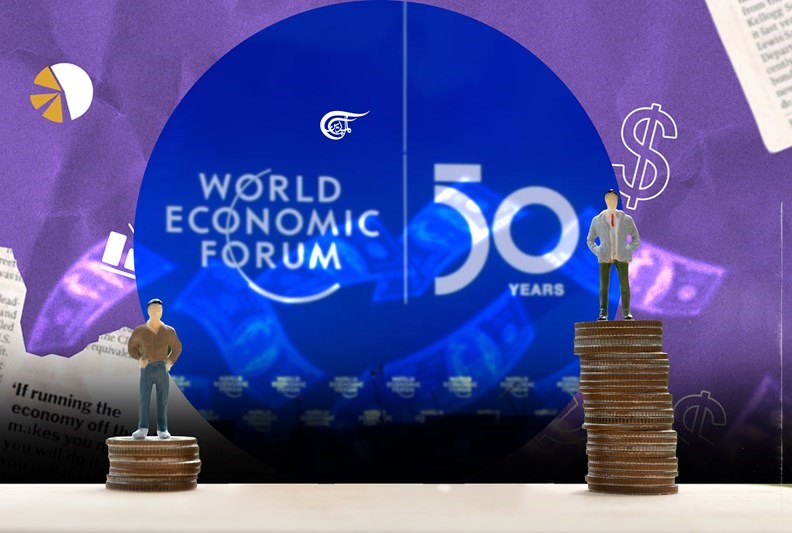Last Monday, January 16, the
World Economic Forum met in Davos.
This is the 53rd meeting of the world economic and political elite, or what Fidel more appropriately called the "imperial bourgeoisie."
Unlike the vast majority of the world population, exploited and oppressed by capitalism, which fails to create a Davos-type structure to coordinate the great struggles of our time, the right knows and appreciates very well the virtues of a world organization and the design of global intervention strategies.
This powerful global conglomerate exalts individualism but knows very well that the only effective way to maintain its privileges is to improve the collective action of the capitalist classes around the globe.
This means acting in concert on the global geoeconomic and geopolitical chessboard to confront, as one unit, the multitude of critics and opponents of capitalism who still insist on fighting locally against a player with a unified global strategy.
To illustrate what we have been saying: you cannot fight against Bayer's pesticides and GMOs, whose production and application in agriculture obeys a global strategy, with isolated and unconnected protests, with little local or regional impact, in the best of cases.
The Davos meeting has had, from the beginning, precisely that mission.
Strengthen the coordination efforts between the dominant actors of contemporary capitalism, refine their strategies and tactics of struggle, and reach a consensus on the diagnosis of the situation and the possible ways to face the challenges it poses.
Also to make a show of force, summon Heads of State and Government from the five continents, hundreds of politicians, economists, experts and an endless number of social communicators who will expand and disseminate
urbi et orbi
the agreements sealed in that Swiss town.
Some 2,700 leaders of global capitalism are expected to attend Davos this year.
The meeting will call for international cooperation in a fragmented world, which is an acknowledgment that the old liberal globalization has fractured, that there are actually “two globalizations” or international economic subsystems.
One, in the North Atlantic world with its tributary extensions in Japan, South Korea, and Australia;
and another, economically more powerful, with its epicenter in China and which radiates throughout Asia and, through the "Belt and Road Initiative", reaches a figure that oscillates between 128 and 144 countries (depending on the year) of the planet.
Within this framework, the Davos experts and strategists will try to reach a consensus on how to face the simultaneous challenges posed by slow economic growth, inflation, the energy and food crises and, said in a low voice, the very serious geopolitical situation in world level and that is expressed with unusual force in the war in Ukraine.
Aware that the legitimacy of global capitalism is increasingly in question, the founder and executive president of the World Economic Forum, Klaus Schwab, proposes strengthening "the ties of cooperation between governments and the private sector."
However, at the height of the pandemic, Schwab raised the need for "a recharged capitalism", in which the role of states in the recovery of the economic cycle is considerably accentuated.
Moreover, he came to speak of "State capitalism."
Now he seems to have softened his approach and revalued the role of the markets, hidden under the euphemism of “private sector”.
But in no case, neither before nor now, did Schwab and his companions hint at the slightest intention of democratizing the capitalist states or of making any effort to redistribute, even minimally, the wealth that has been scandalously concentrated in recent years, especially since the outbreak of the pandemic and, subsequently, the war in Ukraine.
The data provided by the Oxfam 2023 reports is horrifying.
Just consider that “billionaires got richer in the last two years than it had taken them 23 years earlier;
Food and energy billionaires are $453 billion richer than two years ago, while 263 million people fell into 'extreme poverty' in 2022.”
To have another concrete image, Oxfam sums it up like this: "It would take a person belonging to the poorest half of the world's population 112 years to earn what someone in the richest one percent would earn in a year."
Finally, “the richest one percent grabbed nearly two-thirds of all $42 trillion worth of new wealth created since 2020, nearly twice as much money as the bottom 99 percent of the world’s population,” reveals a report. new Oxfam report.
Over the past decade, the richest 1 percent have captured about half of all new wealth;
now catching thirds of it.
This very unfair world is the one that Davos wants to stabilize.
(Taken from Al Mayadeen Spanish)
